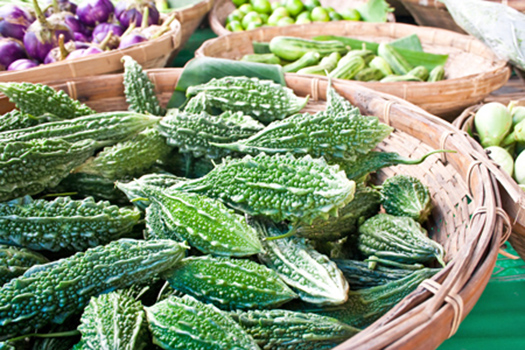Bitter Melon Slows Pancreatic Cancer in Vivo

A new study has shown that the juice of bitter melon, a commonly eaten vegetable in Asia and Africa, markedly suppresses the growth of pancreatic tumors in mice by disrupting the cancer cells’ metabolism of glucose, and literally starving them of the sugar they need to survive.
Bitter Melon: numerous health effects already known
Bitter melon (Momordica charantia) is widely cultivated and eaten across Southeast Asia, Africa, China, Japan, Oceania and even in the Caribbean. It is especially popular among Japanese living in Okinawa, which may help to explain their exceptionally long lifespans. Although eaten for centuries, bitter melon’s many health benefits (anti-viral, antioxidant, anti-diabetes) have only recently come to light in Western medicine, with research on its anti-cancer potential sharply accelerating in just the last four years. Bitter melon has now shown activity against cancers of the breast, prostate, colon, liver, stomach and naso-pharynx, as well as leukemia and neuroblastoma. But not until this latest study has it been shown that bitter melon is also cytotoxic to pancreatic cancer—and potently so.
Potent cytotoxicity against all four pancreatic cancer cell lines tested
Researchers at University of Colorado Cancer Center prepared bitter melon juice by simply purchasing the melons (Chinese variety) from a local grocery store, removing pulp and seeds, then using a household juicer. Solids were removed, and the remaining juice was either tested directly on cell cultures, or freeze dried and ground into a fine powder to be used later for feeding to mice.
When tested against cancer cell cultures, bitter melon juice (diluted to just five percent in water) showed remarkable potency in reducing the viability of all four pancreatic cancer cell lines tested. The viability of AsPC-1and Capan-2 cancer cell lines was reduced by 90 percent, while BxPC-3 and MiaPaCa-2 viability was reduced by 98 percent, after 72 hours treatment. The juice was seen to induce programmed cell death (apoptosis) along several different pathways. More importantly it also activated AMPK, which indicates that it disrupts the cancer cells’ metabolism of glucose, literally starving them of the sugar they need to survive.
Bitter melon inhibits pancreatic tumor growth by 64 percent in mice – at doses achievable in humans
To test the effectiveness of the juice in vivo, researchers implanted mice with MiaPaCa-2 human pancreatic cancer cells, and then fed half of them five mg daily of the freeze dried juice powder for six weeks. Remarkably, mice fed on the juice powder showed pancreatic tumors 64 percent smaller than the untreated mice, and showed no visible side effects. This level of efficacy is similar to that of the chemo drug most often used for pancreatic cancer, which reduced tumor growth by 52 percent in a different study using the same type of mice and cancer cell line (but after 18 days).
It’s worth noting that the five mg dose of powder given to the mice (which weigh about 13 grams each) translates to about six grams of powder for a 75 kg adult. This is quite close to the 4.8 grams of freeze dried bitter melon powder given to adults daily for three months in a recent study on ameliorating metabolic syndrome (it worked), and this dose was “generally well tolerated” according to the study’s researchers.
The discovery that bitter melon starves cancer cells of glucose comes at an interesting time. The disruption of cancer cells’ glucose metabolism happens to be Big Pharma’s hot new target for chemo drug development. This new study has shown us that nature has already supplied us with a safe and cheap natural medicine that does exactly that.
Sources for this article include:
- http://www.ncbi.nlm.nih.gov/pubmed/23475945
- http://www.ncbi.nlm.nih.gov/pubmed/18383843
- http://link.springer.com/article/10.1186/1742-2094-8-64
- http://link.springer.com/article/10.1186/1475-2891-11-4
- http://www.naturalnews.com/028256_bitter_melon_breast_cancer.html
- http://www.nutraingredients.com/Research/Bitter-melon-may-offer-exciting-cancer-promise

DISCLAIMER: All information on this website, including research articles, is for information purposes only and is not meant as a recommendation to buy or use any nutritional supplement, healthcare product or service of any type. Ethan Evers does not provide medical advice directly or through recommended or linked materials, articles etc. All matters regarding your health require medical supervision and advice from an appropriately licensed medical practitioner.






